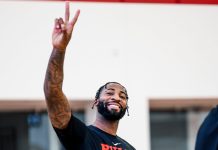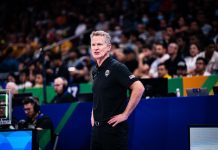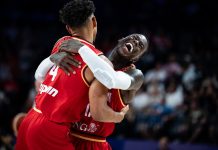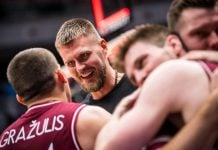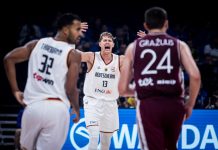 TalkBasket is, unsurprisingly, in Eurobasket mode and we continue our daily preview and power rankings of the upcoming tournament. Today we deal with the projected 13-16 position teams. Read everything you need to know about the National Teams of Russia, Georgia, Italy and Germany.
TalkBasket is, unsurprisingly, in Eurobasket mode and we continue our daily preview and power rankings of the upcoming tournament. Today we deal with the projected 13-16 position teams. Read everything you need to know about the National Teams of Russia, Georgia, Italy and Germany.
13. RUSSIA
It’s been just a year since the Russians were leading 31-20 against Spain at HT in the Olympics’ semi-final (they lost, but still managed to beat Argentina for the bronze medal game). Since then, their coach David Blatt, who led them to three medals since 2007, including the gold in the Spain-based Eurobasket, is gone, substituted by Fotis Katsikaris, who also left the team early in the summer, only to be replaced by Vasily Karasev, just days before the start of the preparation. As if this was not enough, most of the team’s stars, including almost their entire frontcourt, will stay out of international games for now.
Andrei Kirilenko, Victor Khryapa, Sasha Kaun, Timofey Mozgov were the main absences, while a late injury to a very important player in the wings, the long forward Andrey Vorontsevich is going to be even more vital to them, as he had been their facilitator in several exhibition games.
Now, as bad as things have been, Russia still possesses rather good chances to qualify in the top12. In a group where Greece and Turkey possibly look out of reach for them, the Russians have to beat Italy, Finland and Sweden to come out alive. This makes them probably a favourite to finish 3rd, but let’s see what they include in their roster. Their biggest star is Aleksey Shved, who will be a go-to player for the first time since the 2006 Euroleague Junior Tournament in Prague. Long, lanky and athletic, the Minnesota player will be a full time PG and will try to beat his instabilities and the rest of the playmakers of group D. When he doesn’t play well, Karasev has options in the bench. Anton Ponkrashov and Dmitry Khvostov have been back up PGs for Shved in the last two tournaments (where Russia finished 3rd both times, in 2011 and 2012) and this is the sole position that the NT isn’t missing any players. Vitaly Fridzon, one of Europe’s finest spot shooters will start at SG, backed up by Evgeny Voronov.
The problems start in the wings. The 3 and the 4, naturally the positions where Russia was having their biggest size advantage is now looking thin and short. Sergey Monya, naturally a SF, will possibly be forced to play as a full-time PF. Monya will anchor their frontcourt anyway while the small forward position will be covered by the two young and talented wings, Sergey Karasev (Vasily’s son a 1st round NBA draft pick last June) and Dmitry Kulagin. Monya at PF will be backed up by offensively limited players in Semen Antonov and Evgeny Vialev.
But the really bad news come at the center spot, where in absence of Kaun and Mozgov, the team’s most important big becomes Dmitry Sokolov, who has been rather raw offensively throughout his career, despite being a stable and strong defensive presence. Another long and slow big, the veteran Aleksey Savrasenko will be his sole back up. Russia is not expected to get many points in the paint, while other teams will try to push the ball to the box in order to force Sokolov to commit fouls early in games. If they survive the test against Italy and Finland, the Russians are likely in the top12. If not, they are out.
14. GEORGIA
One of the coolest teams of the past Eurobasket and last summer’s qualification games , Georgia was expected to be among the overachievers of this coming tournament. However, key absences and a very tough first round group (unlike their easy one in 2011) has them as favourites to not even advance to the top12 this time.
Being one of the few countries to have two NBA players and several good role players at the Euroleague-Eurocup stage, Georgia has always been a likeable case. Most of their stars always participate with the national team and despite their lack of really big names, they were not big in the European scene until the previous Eurobasket, where they reached the top12 stage. This time though, with their biggest name in center Zaza Pachulia as well as the promising young forward Tornike Shengelia being out due to injuries, they might be forced to compromise with worse results.
In a group consisting of powerhouse Spain, hosts Slovenia and the very talented Croatian NT, it’s the Polish, the Georgians and the Czechs who will fight for an unlikely top12 qualification.
Led by the always-present Manuchar Markoishvilli, the backcourt will be solid and with good chemistry. Markoishvilli, who is still the youngest player to ever see minutes at a Euroleague Final, is upgrading his game when with the NT and is smart, not necessarily fluid offensively, but has good timing in defense despite his lack of athletic abilities. He will be the big name of this team and will spend time at both guard positions, alongside Maccabi’s Ricky Hickman, who had a very good Euroleague season and the very good in the friendly games, the point guard Giorgi Tsintsadze. With Hickman more able to play off-the-ball, we might see schemes of three guards at times and this backcourt certainly looks pretty fine, though thin, as the rest of the guards (Duda Sanadze, Otar Pkhakadze and the once promising Anatoly Boisa) are not guaranteeing similar quality off the bench.
The frontcourt was supposed to be Georgia’s strength until Pachulia’s and Shengelia’s injuries, but they might still have a chance, given that now Giorgi Shermandini (who was good in limited minutes in the Euroleague final for Olympiacos) will start and will also be key for them. A great prospect once, Shermandini has emerged as a defensive factor and a finisher right now, scoring in limited occasions from close range and not being a focal point for the clubs he is playing for. In this Eurobasket, he will be given a great chance to succeed. Next to him, the very steady and strong Viktor Sanikidze, always the starting PF of this team, who is expected to carry a load heavier than usual. Their backups will be thinner than the previous summers in the ex- NBA lottery pick Nikoloz Tskitishvilli, Napoli’s solid rebounder Nika Metrevelli, Levan Patsatsia and Beka Burjanadze. If Shengelia and especially Pachulia were around, the distribution of minutes would be much better and they would be at a more optimistic scenario. Even now though, a combination of results can still bring them to the second round.
15. ITALY
Just a few months ago, this was looking like a nice tournament for Italy. After a long time, since 2003 to be precise, the Italians had a solid and deep squad with roles looking well distributed and, especially, a Marco Belinelli finally coming out of a good NBA season, where he was looking focused and offensively solid. Sadly for them, they were rather unlucky. The nasty injury on the country’s most talented player, Danilo Gallinari as well as a late pull out by Andrea Bargnani is keeping Italy down in the Eurobasket rankings. Daniel Hackett is also out and he would be probably starting at PG for them. The friendly games we watched are not creating any illusions either. Without any solid frontcourt, it is difficult for Italy to hope that they will get out of the group and it is only due to Russia’s key absences down low that they have just a slim chance. That is, if they beat Sweden and Finland, since Greece and Turkey are looking like longshots for the Italians.
Starting with their backcourt, Travis Diener will be the main PG. Projected originally for about 15mins per game, given that Hackett would be there, Diener – who had a fine season with Sassari is a great undersized scorer with good court vision. He will be backed up by usual suspects in Giuseppe Poeta and Andrea Cinciarini, while the long and once hopeful Luca Vitali will possibly see most of his limited minutes as Marco Belinelli’s back up at shooting guard. Belinelli, whose presence was feared to be too influential for the past unsuccessful summers will again be the star and go-to player of this team.
Thankfully for coach Simone Pianigiani, there is enough talent around him in the perimeter. One of Pietro Aradori and Alessandro Gentile will always be on the floor next to Marco and this could give him a hand regardless of his need to constantly have the ball on his hands. Aradori and Gentile, both very solid scorers and shooters, also struggle in defense, like the rest of the perimeter, but might beat opponents offensively.
The power forward position, originally projected to be covered by Gallinari will now see a small forward playing heavy minutes. Luigi Datome, the MVP of the Italian league and one of the best forwards in European basketball nowadays will see most of his playing time there. The forward who will play for Detroit next season, is smart, strong and rather athletic, while he will share minutes with Nicolo Melli, who is one of the most talented forwards of the country offensively and had an ok year in the Euroleague. The center position includes limited players without much offensive flare in veterans Marco Cusin, Guido Rosselli and Daniele Margo, something which means that we might see undersized schemes with Melli at center, Datome at PF and three guards on the floor at times.
16. GERMANY
This summer was supposed to be the time where the most talented generations (1988-1991) of the Germans in the post-Nowitzki era would flourish. With a very easy first round group in this Eurobasket, some good experience in the past for most of the youth and a few of them also enjoying big minutes in their clubs, this Eurobasket was looking promising, especially since the German BBL is slowly becoming a competitive league at the European level, with two teams reaching the top16 stage in last season’s Euroleague.
However, the exclusion of key players in Gonzaga’s Elias Harris and Bamberg Philip Neumann as well as the non-invitation of this summer’s NBA lottery pick Dennis Schroeder is making them look thinner than expected, letting aside that their actual talent had originally been overestimated. The truth seems to be that the German BBL is still far from becoming elite competition and that the overall talent produced in the country, though likeable, is soft and discouraging for the international level. Nevertheless, the Germans need to build somewhere and this is what they have. In a group where three wins against the likes of Belgium, Ukraine and Great Britain likely bring them to the top12, this is still a good scenario. Even Israel looks beatable, while France is miles ahead of them.
Led – obviously – by Heiko Schaffartzik, the backcourt is unathletic and inexperienced. Schaffartzik as the team’s number one offensive option is an overachiever, has heart and leadership skills and is a good shooter, though rather undersized. He can play both guard positions, depending on whom is sharing the backcourt with. Luca Staiger at shooting guard, a natural shooter and not much more or Per Gunther, a soft point guard with a good 3point shot but limited defensive abilities. With Gunther, Shaffartzik and Bastian Doreth all shorter than 6-1 (1.85m), the size of the PG position should also be a worry. Karsten Tadda, who played some solid minutes in the Euroleague will play back up SG.
In the frontcourt, once the most promising prospect in the country, forward Robin Benzing remains soft and hasn’t improved much in the past years, but is still a good shooter and rough to guard, especially when playing small forward. He will though, likely move to PF for good stretches, since the youngster Alex King and the veteran Philip Zwiener have both been solid this season in their clubs, while the power forward spot is looking empty, with only Connecticut’s Niels Giffey playing there.
The center position is looking like their strongest position, as two good Euroleague centers are sharing the minutes in the long Tibor Pleiss of Kutxa Laboral and Bamberg’s strong boy Maik Zirbes. The former is soft and vulnerable but a good scorer, while the latter is always tough to move inside but not as skilled offensively. Andreas Seiferth is not going to see many minutes in this tournament, unless he steals some PF time.
All the previews were written by TalkBasket’s UK based associate Dimitris Ritsonis. You can follow him, as well as send any feedback to him on twitter @wardjdim

